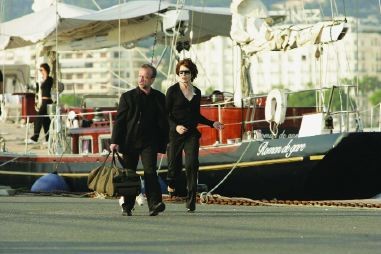Roman de Gare

Claude Lelouch’s 1966 film A Man and a Woman remains the North Star of romantic French movies. It also remains his obit-leader, since Lelouch has done nothing in the past 42 years to approximate that runaway success.
Not that he hasn’t tried. He has directed more than 30 films in the interim, including a fascinating 1995 version of Les Misérables, set during World War II and starring French film icon Jean-Paul Belmondo. But Lelouch seems to have been relegated to the second tier of French directors. He has not accepted this reshelving with a shrug. He believes that critics continue to resent his success with A Man and a Woman.
To prove his point, he released Roman de Gare under the pseudonym Hervé Picard to see if an unknown director might receive more consideration than a supposed has-been. When Roman de Gare was embraced by the critics and festival audiences, Lelouch felt vindicated—and immediately put his own name back on the credits before the critics had a chance to change their minds.
This backstage intrigue is important because Roman de Gare (which loosely translated means “airport novel,” a novel for light reading) addresses such issues as ghostwriting, mistaken identity and secret lives. And the film’s themes are reflected in the way that the story is told.
Roman de Gare centers on three characters who are never quite what they appear to be. The first is Judith Ralitzer, a hugely successful writer of airport novels who lives and breathes the life of the jet set (she is played by Fanny Ardant, a grande dame of the French cinema who worked with film director François Truffaut and later married him). The second is Huguette (newcomer Audrey Dana), a hot-headed woman who goes into most relationships knowing they are going to fail. She is the mistress of self-fulfilling prophecies, angry at her disloyal suitors but more furious with herself. The third is a mysterious man (Dominique Pinon) who may be a college professor who’s recently abandoned his wife and children. Or he may be Judith’s secretary or the ghostwriter of many of her novels. Or he may be an escaped serial killer who performs magic tricks before murdering his victims.
The story begins with an extended argument, quite funny in places, between Huguette and her latest fiancé, a self-absorbed doctor named Paul (Cyrille Eldin), on their way to visit Huguette’s family in the backwoods near the Alps. During a stop for gas, the fiancé drives away, leaving Huguette alone and abandoned. Watching this drama unfold is a man (Pinon) who seems particularly interested in Huguette’s misfortune and offers to help. She is wary. Is he a writer trawling for juicy material? Or a serial killer smelling an easy kill?
Meanwhile, we realize that Huguette may also be living a lie. Is she really a Parisian hairdresser who did Princess Diana’s hair the night before her death? Or is she an angry hooker whose daily life feeds the fires of her self-hatred? And does she really have a daughter somewhere who hates her?
The relationship between the shy man and the fiery Huguette, which occupies most of the film’s first half, is the best part of the movie. Viewers come to see that the masks the two have donned are not a roadblock to intimacy but the psychological key to their success as a couple.
The charm of this intelligent film lies less in revealing who is who and how they fit into each other’s lives than in Lelouch’s meticulous analysis of how expectations and disappointments influence perceptions. Judith needs to keep turning out novels, whatever the cost personally and professionally, because it is expected of her. Huguette believes that she is worthless and undeserving of love because she has been treated that way, and so she overlooks her strengths.
Suffice it to say that Roman de Gare requires viewers who are willing to follow the clues while ignoring the red herrings. Those who are diligent will be rewarded with a smart tale filled with myriad twists that makes a profound point about lying and creativity and the razor-thin line that can separate the two.





